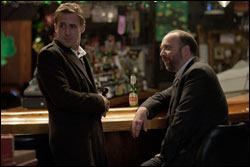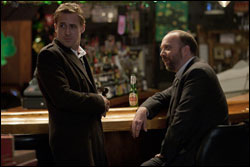For the first thirty minutes or so of The Ides of March, I thought it was basically going to be an updated reworking of The West Wing, Aaron Sorkin’s enduringly popular TV drama that offered a dramatic, behind-the-scenes look at life in the White House. Sorkin’s show was rather famously modeled after the Clinton administration; his President Barlett was a Democrat whose White House faced many of the same issues as Clinton’s, and was even marred by a highly-public scandal.
The Ides of March, meanwhile, is about a different kind of Democrat—a young, charismatic politician who isn’t yet in the White House but would very much like to be. He speaks of a different kind of politics, a change-up from Washington as usual. His supporters are energized by his vigor, and by his perceived integrity; his opponents see him as either too inexperienced or too extreme. Why, even his campaign posters bear a striking graphic resemblance to the iconic Obama/Hope images.

This politician is Mike Morris (George Clooney, who also directed the film), a sitting governor who is running in a Democratic primary that is, essentially, the whole election; the Republicans don’t have any good candidates, but his Democratic opponent offers some stiff competition. But we see from the get-go that his campaign is very different than that of his opponent. Indeed, the competitor’s campaign is being run by Tom Duffy (Paul Giamatti), a veteran political hack who’s just in it for a win, and doesn’t mind getting down in the dirt and slinging some mud if it’s what will get his man into the Oval Office.
Meanwhile, Morris is backed by campaign manager Paul Zara (Phillip Seymour Hoffman) and press secretary Stephen Myers (Ryan Gosling). We see the story unfold through Myers’ eyes; he is a man who isn’t just in it for the win, but because he truly believes that running a good, clean campaign in support of an idealistic yet effective politician can make the world a better place. Myers is the very best at what he does—even Duffy says so—and he makes it clear that he could never, and would never, do his job with such aplomb were it not in service of a candidate he believed in.
As that candidate, Morris seems like the genuine article. In the role, Clooney plays off of (and comments on) his own reputation as a left-leaning politician activist, but also putting to good use his good looks and old-fashioned movie star charm. His Morris is heard arguing passionately for various causes and programs. He opines elegantly about everything from war to the economy to gay marriage, and, whether you agree with his perspective or not, it’s hard to deny that he seems like a man of honesty, a man who loves his country and his Constitution and wants to do right by both.

It’s a view of politics so romantic, even Sorkin’s President Barlett might find it a little difficult to swallow. And when the opposing campaign resorts to some sneaky and underhanded political tactics, we assume the movie is going to be about a good and honest political campaign overcoming the savagery of a less-than-noble one. The movie has all the makings of a populist political inspiration story—or, perhaps, an overt display of lefty propaganda.
But then things start to go wrong. Myers makes a mistake that looks, for a moment, like it might cost Morris the election. Then things get worse. The entire campaign takes a dark turn, scandals reveal themselves, and acts of deception start to pile so high you might have a hard time keeping track of them.
Suddenly, we’re not watching The West Wing: Obama Edition at all. More like David Simon’s The Wire—a show of fathomlessly deep cynicism, one that works from the basic worldview that our political systems are broken beyond repair, and that hoping for anything but the escalation of evil and corruption is sheer naïveté.

Clooney’s hand as a director is assured: His movie starts off a little slow and a little talky but eventually becomes an absolute nail-biter. In a way, it reminds me of a Michael Mann film—say, The Insider. By that I mean that it’s essentially an action movie, one that moves so quickly and takes so many sharp turns you’ll leave finger impressions all over your theater seat and leave feeling a little whiplashed. And yet the thrills all come through character development and intense conversations; there are no scenes of violence here, no guns, no car chases.
In another sense, it reminds one of old-fashioned talky thrillers like Network, or even another Clooney vehicle, Michael Clayton. Like those movies, this one is essentially a very moral movie about very immoral dealings. Indeed, Clooney has said that the first half of the movie, with its rosy picture of Morris and his policies, will energize liberals, and that the second half, portraying Morris’ descent, will prove more popular with those on the political right. But to make this out to be a movie about politics is like, well, making The West Wing out to be a show about politics. It’s certainly there, but it isn’t really the focus. The Ides of March is really a film about moral compromise, and the deterioration of a man’s soul.
Certainly, it’s not the kind of movie one might have expected from Clooney; those hoping (of fearing) for a film awash in activism will be rather startled to find a movie that plumbs remarkable depths of cynicism.

So why would any Christian moviegoer want to watch it—indeed, why would any American want to watch it? For starters, because it’s well-made; much like The Wire, its darkness is illuminated to some degree by the assuredness of the storytelling. But on a deeper level, Ides is a movie that reminds us of the consequences of putting our hope in the princes of this world—and of just how far we’re going to fall when our only hope is in our own goodness or lofty ideals.
Talk About It
Discussion starters- What does this movie suggest about the nature of our ideals—political, moral, and otherwise? Do you think the corruption of these ideals is inevitable?
- How would you characterize the view taken toward our political processes and institutions? Toward any and all human endeavors to improve our world?
- What do you think is the cause, or motivating factor, of Stephen’s deterioration? When do you think things start to go awry for him?
The Family Corner
For parents to considerThe Ides of March is rated R for pervasive language, and it is, indeed, a movie populated with rough, no-nonsense political analysts who use very coarse language throughout the film, including many obscenities and a handful of misuses of Jesus’ name. There are a couple of scenes of sexuality, but nothing explicit is seen. There are also some very intense topics that are addressed, including—and this qualifies as a spoiler—both suicide and abortion.
Photos © Sony Pictures
Copyright © 2011 Christianity Today. Click for reprint information.












